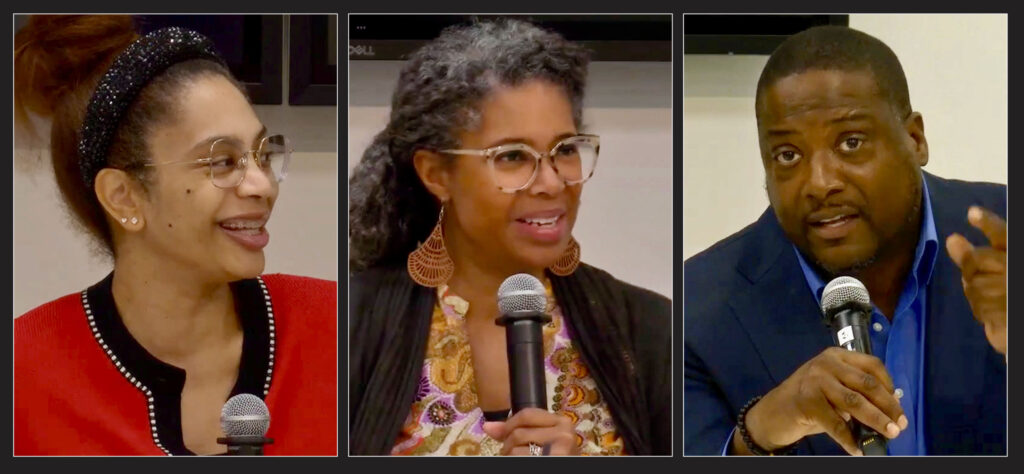
Feb. 27, 2024
“Are we telling the right stories?”
Developer Christopher Dennis said people who never visit the Beatties Ford Road corridor love to tell stories about the corridor’s challenges, from crime and drugs to homelessness and mental health issues.
What if Beatties Ford residents wrote on social media about the new bridal shop drawing young women from across the county? What about the soothing atmosphere at the new tea bar? And what about the guy who mortgaged his own home to raise a missing piece of financing for the renovation of the historic home of John McDonald’s Cafeteria, now reoccupied by Chase Bank and other tenants?
And what about that bank that is so invested in its adopted neighborhood that it named as bank manager a longtime resident of the corridor? Or the other bank with new branches across town that has found its Beatties Ford branch to be leading the pack?
This morning’s discussion featured Tracie Mackins from Mackins Bridal; Sherry Waters of The Pauline Tea-Bar Apothecary; and Dennis, of E-Fix Development Corp.
For young people hungry for information on how to build a business, the video below would be a great place to start. For one, presenters explained what drew them to the corridor, and their growing vision of how to do their part to help other business owners thrive. For another, they tackled the issues that still loom. For Waters, for example, she does not own her own building. If she helps revive the business corridor and lease rates balloon beyond her store’s ability to pay, she might not be able to be a part of the stability she helped create.
Finally, young people can listen to these stories, and then go visit the stores and meet the people shaping them and learn even more.
When a questioner asked for the best and worst advice each of the business people had been given, Dennis offered, “Continue to be the example,” and “You can’t do that. I’ve heard that all my life.” Mackins said she had quickly learned to ignore well-meaning advice that nonetheless was not what she needed to do.
Says Dennis: “Our communities don’t need handouts; they need handshakes.” His model is his collaboration with Chase Bank, which didn’t just want a space, but a presence on the corridor of which they could be proud.
In similar fashion, Dennis and others promoted the idea of city, county and other entities investing in the corridor just as much as they have, say, in South End and NoDa with the light rail line. Near the end of the video, residential developer Bobby Drakeford from his table in the audience made this case.
“Are we telling the right stories?”
Dennis is a developer. You’d expect him to talk about money, And he did: There is a huge need for resources to finance the reinvestments needed in the corridor, he said. Some of that money should, he said, come from residents of the corridor who believe in their neighborhood’s future enough to put skin in the game.
Near the end of the meeting, the conversation turned to how business organizations that were once powerful influencers on behalf of the corridor had shriveled or closed. Remedying that – organizing merchants and helping tell the stories behind revitalization – is another piece of the puzzle.
Below the video from this morning’s meeting is an undated four-minute video offered by Dennis for use on this page. In it, his words mirror those addressed to the Forum. Accompanying his voice are film clips of construction work at the old McDonald’s Cafeteria site.